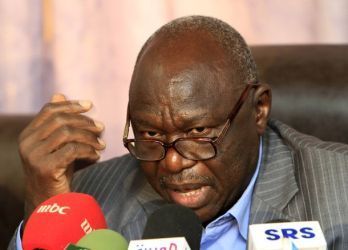Sudanese rebels seek inclusive settlement, rejects selective agreement
May 10, 2012 (JUBA) – The Sudan Revolutionary Front (SRF), a coalition of the Sudanese rebels, on Thursday said it is seeking international support for “inclusive settlement” for the conflicts in Darfur, South Kordofan and Blue Nile and that it would not accept “selective” settlement.

In accordance with the road map the talks between Khartoum and the SPLM-N should be based on a framework agreement they signed between the two parties after talks sponsored by the AU panel in June 2011. Sudan’s president Omer Hassan Al-Bashir has denounced the deal.
The SPLM-N is the dominant party of the SRF, which also includes Darfur rebels the Justice and Equality Movement (JEM) and the two main factions of the Sudan Liberation Army who have been fighting Khartoum since 2003.
President Al-Bashir said Wednesday that he did not agree with the UNSC’s demand that his government negotiate with SPLM-N. On Thursday he said: “We only do the things we want to do. And no security council or the whole world for the matter can force us to act otherwise.”
The commander in chief of the SRF forces and SPLM-N chairman, Abdel-Aziz Adam El Hilu, told Sudan Tribune that “the root cause of conflict in Sudan can never be addressed through selective dialogue. It is requires comprehensive understanding and settlement.”
El Hilu’s comments indicate that the SPLM-N would be unwilling to negotiate bilaterally with Khartoum’s ruling National Congress Party (NCP). Since the SRF was formed in November 2011 the four rebels groups have attempted to integrate their political and military wings.
Speaking from an undisclosed location, which he said was within SPLM-N held territory in Sudan, El Hilu complained of the short memories of the international community in relation to conflicts in Sudan.
“This is the government that has the ability and appetite to kill its own people and deny them all rights including speaking for themselves and decision to elect their leaders,” said El Hilu.
UN agencies estimate that 300,000 people have died in Darfur since the fighting began nine years ago. In the two-decade north-south civil war – when the SPLM-N fought with the South Sudan-based SPLM – an estimated two million died, many from disease and malnutrition caused by the conflict.
As part of a 2005 peace deal that ended the north-south conflict gave Blue Nile and South Kordofan special status and provisions. However, these elements of the agreement were not completed by the time South Sudan seceded in July year and the SPLM-N refused Khartoum’s ultimatum that the group disarm or move south of the new international border.
In April last year El Hilu, formerly the deputy governor of South Kordofan, lost elections to his NCP rival, the incumbent Ahmed Haroun, in controversial circumstances.
El Hilu accused Bashir’s government of carrying out a genocide in the Nuba Mountains of South Kordofan during the previous civil war killing 250,000 people. The SPLM-N also blame Bashir for escalating the conflict after he came to power in a coup in 1989, declaring that the civil war was holy war or ‘jihad‘.
The SPLM-N leading figure pointed out that Bashir had been indicted by the International Criminal Court for alleged war crimes, crimes against humanity and genocide in Darfur.
“It is the same government in Khartoum under the same Bashir who introduced Osama bin Laden and Al Qaeda to the world”, he said, referring to the fact that Khartoum hosted the terrorist leader for five years in the early 1990s.
During Bashir’s rule Sudan was also accused of attempting to assassinate former Egyptian president Hosni Mubarak in Ethiopian capital Addis Ababa in 1995, El Hilu said.
“It is the same Bashir who smuggles guns to Hamas. It is the same Bashir who helped and established the Lord’s Resistance Army against the government of Uganda,” he told Sudan Tribune on Thursday.
Bashir received a lot of international credit when he accepted South Sudan’s vote for independence last year but the former South Kordofan deputy governor said that the international community has failed to realise how many peace agreements Bashir had not honoured and his disrespect for international law.
“Bashir has dishonoured more than 43 peace agreements including key provisions of the Comprehensive Peace Agreement which was not a simple agreement, it was the most important agreement, the baby of the international community, arrived at by international pressure. I didn’t expect the international community just to throw away it like that, they should have defended it”, he said.
He said the conflict between the marginalised areas of Sudan and the centre should be properly understood because it was actually targeting all Sudanese people, but specifically those from Darfur, in the East, far North, Blue Nile, Nuba Mountains and Abyei. He explained that the vision of the rebel alliance is to completely change the regime in Khartoum and to transform the system.
“We are working for regime change, for complete transformation, for writing a new constitution, a democratic constitution that recognises diversity that accepts the liberal values of justice, equality, individualism. We want to achieve lasting peace and justice in this country. Some may say we are not qualified to reach this but I think it is possible”, he said.
(ST)
